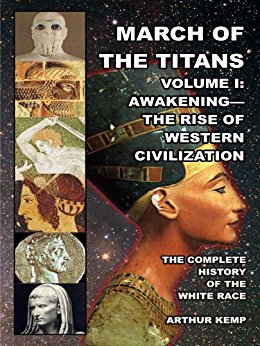 For a few years I have been reading racialist literature and have come to the conclusion that William Luther Pierce ought to be considered the central intellectual figure of American racialism (George Lincoln Rockwell on the other hand was perhaps the noblest individual on this side of the Atlantic). Besides his superb essays Pierce inaugurated the novelesque genre of a revolutionary takeover of white societies, and his axiological ruminations about the history of the white race in Who We Are are still unsurpassed among American racists. Unlike the national socialists and William Pierce, nowadays white advocates are comfortably living under the sky of Christian and liberal ethics, as I will try to argue in this article. Greg Johnson for one, the editor-in-chief of the webzine Counter-Currents Publishing, has been ambivalent on Pierce. He wrote:
For a few years I have been reading racialist literature and have come to the conclusion that William Luther Pierce ought to be considered the central intellectual figure of American racialism (George Lincoln Rockwell on the other hand was perhaps the noblest individual on this side of the Atlantic). Besides his superb essays Pierce inaugurated the novelesque genre of a revolutionary takeover of white societies, and his axiological ruminations about the history of the white race in Who We Are are still unsurpassed among American racists. Unlike the national socialists and William Pierce, nowadays white advocates are comfortably living under the sky of Christian and liberal ethics, as I will try to argue in this article. Greg Johnson for one, the editor-in-chief of the webzine Counter-Currents Publishing, has been ambivalent on Pierce. He wrote:
Some time later, on April 22, 2000, I purchased [the novels] The Turner Diaries and Hunter from Dent Myers at his Wildman’s Shop in Kennesaw, Georgia. Frankly, I found them repulsive, The Turner Diaries in particular. Pierce may have been inspired by National Socialism, but his model of revolution was pure Lenin and his model of government pure Stalin. If he had the power, he would have killed more people than Lenin, Stalin, Mao, and Pol Pot combined.
Johnson, overwhelmed by his morals, is not even recognizing here that the national socialists were the good guys for Aryan preservation, and the heads of the states he mentions the bad guys.
He epitomizes everything about the Old Right model that I reject: one party politics, totalitarianism, terrorism, imperialism, and genocide. At the time, I remarked that as a novelist and political theorist Pierce was a first rate physicist.
I regarded him as a monster…
Take note that Johnson’s webzine is considered by some the crème de la crème of white nationalist blogsites, something like a haute culture magazine for the sophisticate, and that he presents himself as a fan of Friedrich Nietzsche to his readership. The trouble with Johnson is not only that he’s living a double life—criticizing Christianity online and delivering pious, traditional homilies at the Swedenborgian Church of San Francisco—; he really wants to have it both ways. Sometimes he seems to be in favor of revolutionary action but other times he condemns violence. In Johnson’s own words in his so-called “New Right” manifesto, “the only gun I want to own is made of porcelain.” Doesn’t this amount to say that he rejects winning, since throughout history there has been no nation-building without violence? This is Alex Linder’s pronouncement on Johnson: “His attempt to claim heir to the legacy of Hitler and Mussolini while renouncing actual fighting, and going beyond that to denounce those men’s movements in pretty much the same terms Jews do [“I regarded him as a monster…”] is simply bizarre. And that, in particular, he should not be allowed to get away with.”
Elsewhere I have quoted Nietzsche’s Zarathustra having in mind Johnson’s manifesto. But what would a genuine Zarathustran voice sound like? Simply put it, someone who advocates the transvaluation of values back to the pre-Christian mores in the West.

Hitler contemplating a bust of Nietzsche
What stands between Moses’ old Tablets and Zarathustra’s new, half-written Tablets—the new ethical code that, ideally, will rule white behavior in a coming thousand-year Reich? At Radio Free Mississippi, Linder has blamed Christian scruples by way of an example. My paraphrases: What would be our first reflex when watching an adult, African-American male in a park replete with blond, unprotected toddlers? Pull the trigger on the intruding nigger of course! Linder then asked rhetorically what on Earth is functioning as malware for the white mind that impedes us from following our primitive, natural instincts? His answer: “It’s Christianity,” in the sense that our basic moral grammar is Christian even among atheists: a sort of hypertrophy of our sense of decency from a survivalist point of view.
Even racialist Christians concede a point. Brad Griffin, a southern nationalist, has been unearthing citations of the Yankee mentality in antebellum America. Griffin’s conclusion is that abolitionism was caused by “a moral, religious, and ideological revolution in worldview,” and that “the twin doctrines that are to blame for our decline, which brought about this critical shift in moral outlook, are the Enlightenment’s ideology of liberal republicanism and the spread of evangelical Christianity.” Griffin of course is afraid to mention the C word: Christianity without adjectives. In my own words, the moral grammar ingrained to our psyches that places limits to the fourteen words comes not only from Christianity, but from Christianity’s secular offshoot, liberalism or as I like to say, “Neochristianity” (see The Fair Race’s Darkest Hour).
Billions will die, we will win
Are you a Nietzschean or, like Johnson and many white nationalists, a religious Christian / secular Neochristian? The following is my litmus test to gauge who, despite claims to the contrary, is still internalizing the meta-ethics of our parents instead of taking a leap into full-blown Nietzscheanism. In the coming racial wars of the 21st century that, according to Guillaume Faye, will come under the apocalyptic sign of Mars and Hephaestus, how many racial enemies do you think will have to be slain to fulfill the fourteen words? This is my straight answer: If I have to kill five people to fulfill our most cherished words I kill five people. If I have to kill five billion I kill five billion.
Unlike the mere reactionary writers and pseudo-apostates from Christianity in the movement I consider myself a genuine son of Zarathustra who finds himself sitting and waiting —old Mosaic, broken tablets around me and also new, half-written tablets—, wondering when cometh mine hour. On the other hand, Christians, secular liberals, reactionaries and even white nationalists have a sort of malware or computer bug within their skulls that compels them to place limits after the first few thousand killings. Johnson is only one example among many secular Neochristians in the white nationalist movement.
The current paradigm that enslaves almost all whites is like a Red Giant star that has already exhausted its hydrogen core (Christianity). After the French Revolution the enormous inertia of Christian ethics engendered a meta-ethical monster, now producing carbon from helium. This giant, secular, red shell of liberalism is but the sign of an approaching death of a star of that size. Though inflated and tenuous, the red shell is still very hot and makes the star’s radius immense. Presently liberalism is covering, and slowly engulfing and burning, the entire West and specifically targets the Aryan DNA for destruction. As explained in The Fair Race, the Red Giant is the present, secularized form of Christian ethics that has exhausted its creed. In this moribund stage, out-group (non-whites) altruism takes over liberal society. This happens, paradoxically, at the expense of traditional religious doctrine. On the other hand, after the genocide of Germans from 1944 to 1947, the Hellstorm Holocaust (again, cf. The Fair Race), genuine Aryan nationalism is not even one of our firmament’s stars. Like a tiny gaseous sphere already leaving the cradle of the nebulae, Aryan nationalism is accumulating more and more mass that is forming a center of higher density to form a protostar. When enough pressure in the interior rises—when a considerable mass of Nordish Aryans wake up again and fight in the real world as the Germans did—, it will increase the density and temperature until the gas turns into plasma. Only then a nuclear fusion will be ignited at the core and a new baby star will be visible again in the canopy of heaven.
What prevents nationalists from attracting, by the sheer force of their gravitas, increasingly more spiraling mass to make nuclear reaction possible, as happened in the Third Reich? Answer: Most whites, including white nationalists, still gravitate around the dying Red Giant that, by the next century, will become a white dwarf. They’re not really gravitating around the gaseous corpse of the National Socialist nebulae that is forming another new star even while Christianity is dying and will certainly be dead in the next century. The goal of my books is to point out at the firmament the new constellation of ethics that is being formed before any serious discussion can even take place on how to fulfill the fourteen words, our half-written Tablets.
The Star Child
One of the earliest reviewers of 2001: A Space Odyssey wrote in 1968 that it was the first Nietzschean movie in history, and it is too bad that Arthur C. Clarke’s literary agent, Scott Meredith, showed Clarke the green bill in the early 1980s to tempt the author into betraying his philosophy and original movie script by writing cretin sequels to his magnum opus. Anyway, before the sequel prostitution took place, in the epilogue to The Lost Worlds of 2001 Clarke wrote:
What lies beyond the end of 2001, when the Star Child waits, “marshaling his thoughts and brooding over his still untested powers,” I do not know. Many readers have interpreted the final paragraph to mean that he destroyed the Earth, perhaps in order to create a new Heaven. This idea never occurred to me; it seems clear that he triggered the orbiting nuclear bombs harmlessly…
But now, I am not so sure. When Odysseus returned to Ithaca, and identified himself in the banquet hall by stringing the great arrow bow that he alone could wield, he slew the parasitical suitors who for years had been wasting his estate.
Why should we expect any mercy from a returning Star Child? Few indeed of us would have a better answer, if we had to face judgment from the stars. And such a Dies Irae may be closer than we dream…
In the culminating scenes of the film Kubrick’s use of Thus Spake Zarathustra, Richard Strauss’ tone-poem after Nietzsche includes the returning, placental child.
If something has any resemblance to science-fiction’s cathedral it is what in my soliloquies I call “Neanderthal extermination,” exemplified by Pierce in both The Turner Diaries and in all seriousness in a few passages of Who We Are. Der Juden saw it all right with their book of Joshua: only ethnic cleansing protects the race from the interbreeding that invariably occurs with time, and the moral I gather from Kevin MacDonald’s second book of his trilogy is that whites should imitate the tribe by adopting an endogamous form of collectivism diametrically opposed to our naïve, individualist societies. In a radio debate on exterminationist anti-Semitism Griffin told Linder that we must describe the Jewish problem like MacDonald does: never hinting to final solutions for fear of being called evil Nazis. But even MacDonald hints to a solution not only to the Jewish problem, but to the many other racial problems that are afflicting the race—though he will never formulate it openly for fear of losing his tenure: “The Greek and Roman pattern of conquest and empire-building, unlike that of the Israelites described in the Tanakh [Pentateuch], did not involve genocide followed by the creation of an ethnically exclusivist state…” (A People that Shall Dwell Alone, page 368). What MacDonald refrains from discussing, the ethical conundrum between extermination or expulsion, Pierce already discussed in the chapter of Who We Are about the last Nordic invasion of ancient Greece. But let’s elaborate my litmus test even further where I left it—“wondering when cometh mine hour…”
A thought experiment
While driving your car in the routine trip to your job imagine you are given a one week, Star Child powers over planet Earth like those described by Clarke and indulge yourself in a thought-experiment: that you are the metamorphosed astronaut Dave Bowman that returns to your home planet after a journey beyond the stars. What would you do?
Monday. After your second coming to Earth, this time above the clouds and with great power and glory, the first thing that comes to your mind are the traitors in charge of the white nations, so firmly decided to exterminate their own people through genocidal levels of immigration and mestization. You condemn to death the 5 heads of the most powerful Western states. At any event, there’s no human power that matches yours…
Tuesday. But is this enough to secure the existence of your people and the future of white children?, enough to be sure they will survive the West’s darkest hour after your week of Overlord power is over? What about terminating 50 of the most notorious, powerful enemies of whites, the Jewish moguls of the media that have been poisoning the well for so long?
Wednesday. “But that’s still too short” you wake up and say to yourself in anguish during these nights of virtual insomnia. After all, you want to be sure that the fourteen words are not threatened by ulterior human behavior in the centuries to come. What about eliminating 500—you say to yourself in the morning—or, still better, 5000 you conclude in the afternoon, of the most notorious leftist academics: those Jews and non-Jews who have been trying to deconstruct the West and have corrupted the minds of the young?
Thursday. Alas for the earthlings!: you’re still confronted by the voice of your consciousness! The academics and media moguls were not enough! The poisoning continues. This day you have to be bold enough and get rid of 50,000 of the media staff, mostly Jewish, that have been demonizing whites and your culture through the TV and Hollywood.
Friday. But aren’t you still too short on numbers? your inner daemon asks. What about those non-media guys who believe that the best of the goyim must be destroyed, i.e., the white Aryans? They’re still breathing and their hatred for your people has not diminished… What about calling home 500,000 non-gentiles, or even more conclusively 5,000,000; —oh no!—, better fifteen million for a final solution of the non-gentile problem, you conclude in the evening.
Saturday. Alas! You find out that you’re still too short to be a hundred percent sure that our most sacred words will be fulfilled after your power evaporates by tomorrow midnight. You just remembered that the Red Giant is still covering the whole West with the suicidal flames of Neochristianity. And you are not a monocausalist after all… Wiping out the subversive tribe was not enough, not barely enough, you are starting to realize, in a world where most whites have been turned into body-snatched pods. In this weekend that your powers will vanish you must confront the view that the zeitgeist that has been destroying your people since the Second World War is ultimately based on Christian ethics, and that this hypertrophy of the Aryan super-ego has virtually infected all whites. You don’t want to take any chances unless and until they have been cured of their suicidal, malignant lunacy—which won’t happen by itself within your weekend of Overlord power. Why not calling home once and for all 500 million of the infected whites, the deranged, out-group altruists?
Sunday, Day of the Lord. Not enough! (sob…). Your dwindling powers are not enough to see the future and be certain that the very traditional whites whose lives you just spared will have the nerve to deport those millions of non-whites who have been breeding like rats throughout your sacred lands. So you take a fateful, ultimate decision. You will make of this final day a scorched-Earth moment, a wrathful and vindictive day. (Only full revenge can heal the soul after all…) Only thus you will make it sure that the racial aliens won’t be invited again by the potential altruists who, unbeknownst to you, escaped justice yesterday and may fall into their old habits in the future. After all, doesn’t the mental disease of whites, universal moralism, predates Christianity (for example, in the Aryan Buddha)? And after Christianity started to expand a thousandfold into Neochristianity, didn’t your people’s sense of fairness and pity towards non-whites became infinitely more threatening for your goal than the depredations of the (now defunct) tribe?
Now you remember the last chapter of the Zarathustra, “The Sign,” when Zarathustra rises in the morning and finds a lion outside his cave, which he takes to be a sign that the Overman is finally coming. This new Zarathustra —you— rises triumphantly, realizing you have overcome your final sin: pity. And so you don’t want to take any chances with the surviving Neanderthals—not in this big day of yours! You go for the only figure that really solves the problem in a single stroke. You play God. You take the lives of 5 billion or even more of non-whites experiencing the same remorse that you experienced when you took the first 5 lives almost a week ago…
A favor
How far would you go chasing over Dave’s 14 words—white children for the endless ages to come before the Sun really turns into a Red Giant? I ask you this favor: Indulge yourself in the above thought-experiment when you go to work and suffer the sight of those non-white faces that the system socially-engineered to exterminate your kind through miscegenation. But please first watch 2001 in one of your days off so that you may grasp the film’s religious message unmolested by any external noise.
Don’t respond in the comments section of my blog which number of deaths, or until which day of the week, you imaginary chose to intervene in mankind’s destiny. My Gedankenexperiment only gauges your internal morals for you.






